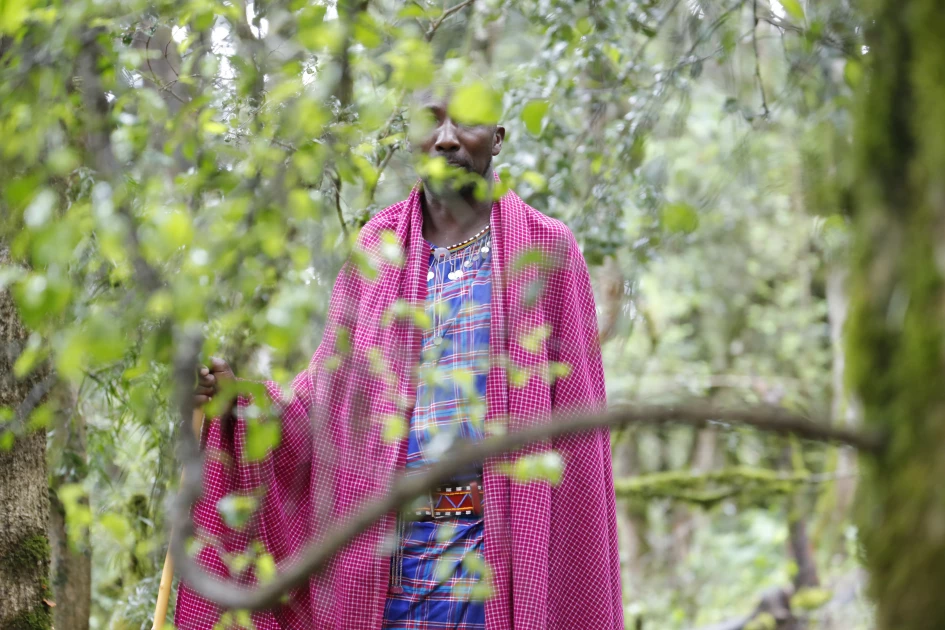Judiciary embracing community structures in environmental conservation cases

Masek Meipuki, a village elder and farmer in Loita.
For the Loita Maasai community, this forest is more than a collection of trees; it is a sacred entity that sustains their livelihoods, anchors their spirituality, and safeguards their cultural heritage.
“This forest is so sacred to us,” says Masek Meipuki, a village elder and farmer in Loita.
As he watches his livestock graze, Meipuki rests on a log that fell a decade ago but remains intact—a symbol of the forest’s enduring vitality.
“It provides our livelihood and is our heartbeat,” he reflects. From timber for shelter to medicinal plants, wild fruits, and honey, the forest offers more than material wealth. It is also a spiritual refuge where the community seeks divine blessings in times of need.
Whenever the women were not giving birth, they ran to the forest to seek blessings.
“When the women don't give birth, or they stay for a long time without seeing young children in their homestead, they go to the forest and seek God. There are specific trees and there are specific ceremonies that are done in the forest to appease God, to bless the women and their children,” alluded Meipuki.
For generations, the Loita Maasai have relied on their indigenous knowledge to preserve this ecosystem.
Their traditions serve as a compass for sustainable living, guiding practices such as rotational grazing and forecasting weather patterns based on subtle changes in the forest.
This wisdom has also proven invaluable in resolving land disputes, fostering harmony without external intervention.
Meipuki believes such practices could enrich Kenya’s judiciary in addressing land and environmental cases.
Lady Justice Jacqueline Mogeni, President of the Pan-African Environment and Lands Association, agrees.
She has witnessed a surge in environmental and climate-related cases in Kenyan courts, from disputes over riparian land to conflicts between conservation efforts and community livelihoods.
“We’ve seen devastating effects of climate change, and judges must understand these issues to make informed decisions,” she says.
Justice Mogeni recalls a recent case involving a lion. Rather than delivering a unilateral judgment, she facilitated a mediation process that brought together stakeholders, including the Kenya Wildlife Service (KWS), game rangers, and conservationists.
The result was a mutually beneficial agreement that was later adopted as a court judgment. “Such approaches build trust and encourage dialogue,” she notes.
Her passion for climate justice is rooted in her experiences as a judge. Training on climate change, she says, has sharpened her understanding of issues such as climate financing and the socioeconomic impacts of environmental degradation.
“It has helped me wear the shoes of the community when making decisions,” she explains. For Mogeni, the inclusion of Indigenous Peoples and Local Communities (IPLCs) in decision-making processes is not just important—it is imperative.
This sentiment is echoed by Jackson Kiplagat, head of conservation programs at WWF Kenya, emphasizes that environmental governance must prioritize equity and representation.
Through partnerships with organizations like Haki Jamii, WWF they are equipping judges with the knowledge they need to navigate complex climate and environmental cases.
Zipporah Muthama, Executive Director of Haki Jamii, highlights the disproportionate burden IPLCs bear due to climate change.
“They are often the first to feel its effects, yet their voices are rarely included in policy-making,” she says.
Including IPLCs in legal and governance frameworks, both nationally and internationally, is critical for advancing climate justice and ensuring sustainable development.
The Loita Forest stands as a living testament to the power of indigenous knowledge and community-led conservation.
But it is also a reminder of the urgent need for systemic change. Judges, as custodians of justice, must be equipped to navigate the complexities of climate-related cases with empathy and expertise.
As the rain continues to fall over Loita, Meipuki’s words carry a quiet urgency. “The respect for our environment is what keeps this forest alive.”
His message is a clarion call—to preserve not only the forest but also the lives and traditions intertwined with it. In the corridors of justice and the hearts of communities, the echoes of Loita must not fade.
Want to send us a story? SMS to 25170 or WhatsApp 0743570000 or Submit on Citizen Digital or email wananchi@royalmedia.co.ke
Comments
No comments yet.


Leave a Comment